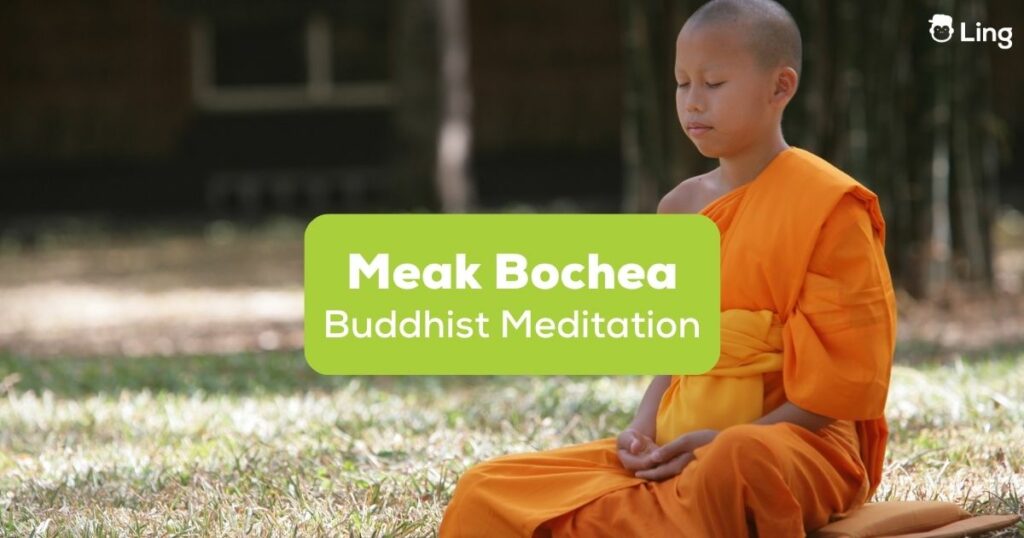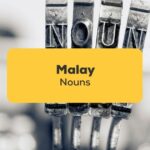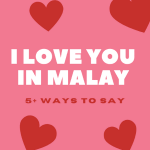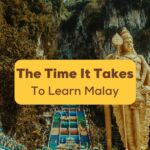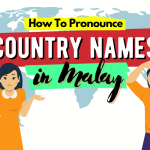Have you ever tried Buddhist meditation? I first gave it a go back in 2020 with a type called Metta or “Loving-Kindness meditation.” It was awesome, and probably one of the reasons I got into meditation more seriously. I later found out that metta comes from Theravada Buddhism and is often practiced during Magha Puja in Cambodia.
Magha Puja, also called Meak Bochea, is a huge Buddhist holiday there that happens on the full moon between February and March. On this special day, Buddhists across Cambodia mob to temples to give donations, pray, and join candlelight marches. Many also use it as a chance to meditate in ways rooted in Buddhist teachings.
Curious? Let’s explore this awesome event and some of the most meaningful Buddhist meditation rituals done by monks in Cambodia. We’ll learn how meditating during Magha Puja sets vibes of loving-kindness. We’ll pick up some related phrases in the Khmer language along the way, too.
Table of Contents
Meak Bochea – Festival Of The Monks
Meak Bochea, also known as Magha Puja Day, Meak Bucha, or Makha Bucha Day, marks the day when 1,250 monks gathered spontaneously to hear Lord Buddha deliver key principles of Buddhism. It falls on the full moon day of the third lunar month and will be celebrated this year on February 24th.
This sacred festival is celebrated at temples across Cambodia, especially prominent sites like Angkor Wat in Siem Reap. Devotees bring offerings to monks, light candles, circumambulate temples, and meditate together into the evening. Many Cambodians also use this holiday to visit family near and far and perform good deeds.
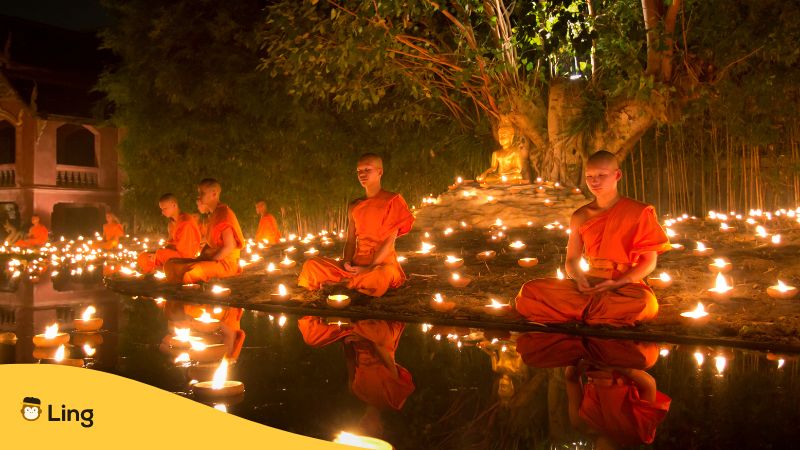
Popular Buddhist Meditation Techniques
Meditation has always been central to Buddhist practice as it allows one to pursue enlightenment and inner wisdom. Buddha himself achieved nirvana through intense meditation under the Bodhi tree. Hence, all Buddhist traditions emphasize meditation as vital, be it Theravada Buddhism, which is predominant in Southeast Asia, specifically in countries like Cambodia, Thailand, and Myanmar, or Mahayana Buddhism in East Asia.
Meditation allows Buddhists to train their minds, pursue ethical living, develop wisdom, and progress spiritually. It helps them move from theoretical knowledge about the Buddha’s teachings to experiential direct knowledge by observing the workings of their own body and mind.
Several meditation techniques are commonly practiced by Cambodians during Meak Bucha celebrations:
1. Mindfulness Meditation – Smaanasaṃmaanti
Mindfulness meditation is the most popular Buddhist meditation practice. One has to concentrate on his or her breath, bodily sensations, or a single object to silence their chattering mind. This eventually builds focus, awareness, and inner peace.
It might seem easy, but bringing your focus to the present moment and keeping at it is quite challenging. It takes regular practice, but once you get into the rhythm, there is nothing quite as blissful as the meditative experience. I can vouch for that!
2. Contemplative Meditation – Vipassana
Contemplative meditation involves the systematic investigation of the nature of reality and the mind. Practitioners examine their thoughts, emotions, and sensory experiences with mindfulness and curiosity, seeking to understand their true nature.
I have been to Vipassana retreats twice till now, and they were some of the best times of my life! Although challenging initially, this practice deepens insight into one’s own being. I had to maintain silence throughout the retreat. But as time went by, I started being comfortable in my own being and could spend longer periods in what could be termed as ‘zoned out’ in the Gen Z lingo.
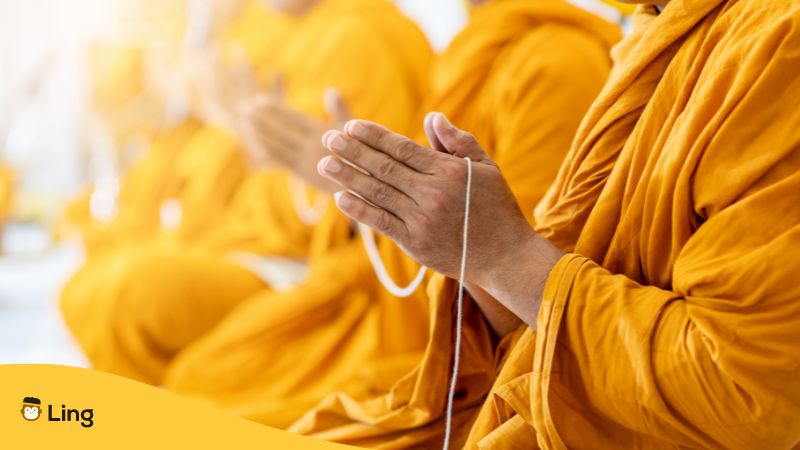
3. Loving-Kindness Meditation – Metta Bhavana
Also called Metta meditation, this uses mantras and visualizations to cultivate love and compassion for oneself and others. This enhances empathy, forgiveness, and interconnection.
The most popular Buddhist chant for metta meditation is Om Mani Padme Hum. The rhythmic chanting of these sacred syllables invokes blessings, grace, or protection and helps the person go into a tranquil state of mind.
4. Breath Awareness Meditation – Aanaapaanasati
Breath awareness meditation involves focusing attention on the breath as it moves in and out of the body. Practitioners observe the natural rhythm of their breath, bringing their attention back to it whenever the mind wanders.
The most simple way to practice it is to count your inhalation and exhalation. For instance, count one, draw a deep breath while counting to six on your mind, then hold your breath to the count of three, and then exhale to the count of six. Easy!
5. Walking Meditation – Cankamana
Yes, this might sound weird, but walking meditation is a concept. It’s a slow, mindful walking with full awareness of bodily sensations and surroundings.
People focus their attention on the sensations of walking, such as the lifting and placing of the feet, while maintaining awareness of the present moment. It’s often alternated with sitting to facilitate reflection. It’s a great way to integrate mindfulness into everyday activities.
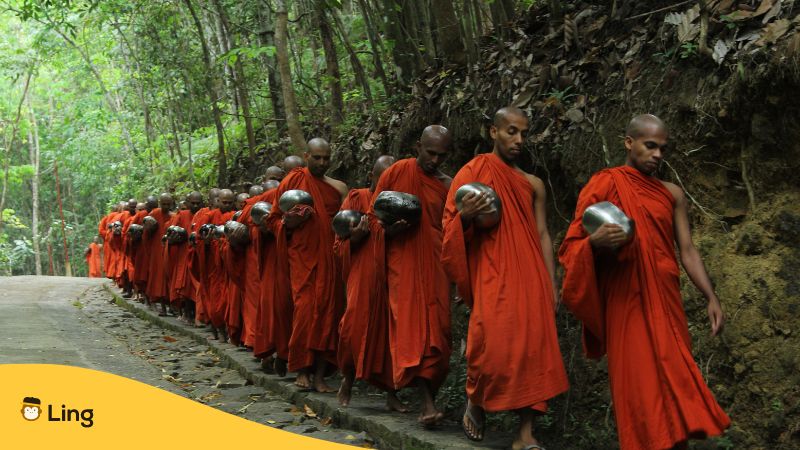
Cambodian Celebrations During Meak Bucha
Meak Bucha sees temples and shrines across Cambodia flooded with devotees engaging in prayer and meditation. As the full moon rises, here are some common practices:
Mass Gatherings At Temples & Shrines
Thousands congregate at popular Cambodian holy sites like Angkor Wat for prayer ceremonies or attend dharma talks by senior monks. People also go on a candlelight procession and late-night walking meditations.
Offerings & Prayers To Monks
Devotees also line up to offer gifts of food, fruits, flowers, candles, and money to monks in gratitude. They also seek monk’s blessings and meditate to absolve themselves of their karmic debts.
Candlelight Processions
This is the star highlight of Meak Bucha. Cambodian people circumambulate temples carrying flowers, incense, and glowing candles while meditating in unison. This symbolizes spiritual illumination chasing away inner darkness.
Worship Rituals Led By Monks
Monks lead multi-hour meditation and prayer rituals inside temple sanctums as devotees follow in deep contemplation while reflecting on core Buddhist teachings.
Basic Khmer Phrases & Vocabulary
To help travelers and expats living in Cambodia enjoy this festive experience and engage with locals, we are giving some foundational Khmer words and phrases. You can learn many more similar Khmer vocabulary via the Ling app.
| English | Khmer | Transliteration |
|---|---|---|
| Buddhist Religion | សាសនាព្រះពុទ្ធសាសនា | Sasaṅgha Preah Putthasaṅgha |
| The Buddha | ព្រះពុទ្ធសាសនា | Preah Putthasaṅgha |
| Monk | ព្រះមហាក្សត្រ | Preah Mohaksat |
| Dharma (Buddha’s teachings) | ព្រះគុណធម៌ | Preah Kounthéa |
| Nirvana (Enlightenment) | គិរីស្តាយ | Kiri Say |
| Meditation | មិត្តទាន | Mittāpān |
| Buddhist Meditation | សូណាព្រះពុទ្ធសាសនា | Souna Preah Putthasaṅgha |
| Mindfulness | ការប្រាក់សរសើរ | Kār Preak Sor Saer |
| Contemplation | គិតស្នាដៃ | Kit Snadai |
| Concentration | កម្រិតស្នាដៃ | Kamriat Snadai |
| Meak Bucha Festival | មាឃព្រះពុទ្ធសាសនា | Meak Preah Putthasaṅgha |
| Offerings to Monks | គិរីបុត្រមមិនបោរ | Kiri Botrom Min Bor |
| Temple Visit | ការព្រមានប្រាសាទ | Kār Promean Brasat |
| Buddhist Ceremony | ការអធ្រាត្រព្រះពុទ្ធសាសនា | Kār Atrat Preah Putthasaṅgha |
| Meditation Retreat | បដិទស្រទាប់ | Botet Srotab |
| Meditation Altar | ព្រះស្រោមទំព័រ | Preah Sraom Tompea |
| Buddhist Chanting | ចម្រាញ់ព្រះពុទ្ធសាសនា | Chamreah Preah Putthasaṅgha |
| Holy Water Blessing | ស៊ិនទ្រកចាប់ព្រះទឹក | Sintrork Chap Preah Tok |
To Wrap Up
You know, tuning out life’s noise to chant alongside monks or join thousands in candlelit meditation sounds like a moment of precious inner peace. And the fact that Cambodians use Meak Bochea to also free caged creatures shows deep reverence for all lifeforms…now that’s classic gentle Buddhist values!
Want one surefire way to level up that cultural immersion? Download the Ling app for some key Khmer phrases before arriving! When you can chat comfortably with welcoming locals, moments like Meak Bochea glow even brighter. Plus, it never hurts to order street food in Khmer, either!
